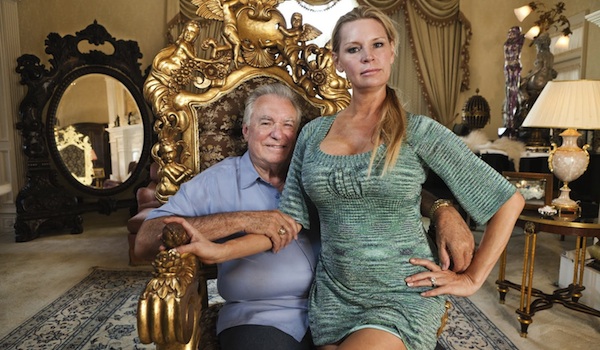The Queen of Versailles

The Queen of Versailles depicts a train wreck.
Not an actual train wreck, mind you; It’s actually about a family struggling through the 2008 financial crisis. But it’s as horrifying as the most horrifying train wreck, and director Lauren Greenfield gives it to you without censors and in extreme slow-motion.
The “Queen” of the film’s title is Jackie Siegel, wife to David Siegel—the owner of Westgate Resorts, the biggest time-share company in the world circa 2008. “Versailles” is their half-finished palatial home on the Florida coast; It will be the largest single-family home in the country when its 13 bedrooms, 22 bathrooms, nine kitchens, two movie theaters, two pools, 20-car garage, bowling alley, ice-skating rink and baseball field are completed.
When the market began to crash, however, plans for Versailles was on hold; David Siegel was struggling to keep his business afloat. Time shares weren’t priorities for Americans, and banks simply quit loaning money. Siegel had just cut the ribbon on a massive tower in Las Vegas before the recession began, and he was starting to default on his credit. It was just a gigantic mess.
At home, things weren’t better. Jackie fills up six shopping carts when she goes shopping. They lay off servants, and Jackie is forced to actually take a role in maintaining the house. Their seven kids (plus an adopted niece) don’t take either parent seriously. And David can’t leave his work troubles at the office; He takes his frustrations out on his wife, and she’s thick enough to imply that their relationship is stronger than ever.
Jackie actually comes off as a remotely sympathetic figure—at least when you compare her to her husband. She’s not the brightest bulb in the box, but she’s not a total fool, either. Yes, her comically over-sized breasts and Botoxed-six-ways-to-Sunday face make her look like just another trophy wife. But one senses that she’s pretty perceptive—maybe just in denial, or playing a certain part for the cameras. Her past as an engineer is evidence enough that while she might be out of touch, she’s not a total moron.
David, on the other hand, is a class-A dick. He wants nothing to do with his kids, and he refers to Jackie as just another child of his. He brags about doing something that “might not have been legal” to give the 2000 presidential election to George W. Bush. He just doesn’t care about anyone or anything other than his money. It’s awful. The Queen of Versailles is an excellent documentary—probably the best of the year so far—but if it has one fault, it’s that listening to David, spending time with him, is excruciating.
The film works on a host of different levels. We get a glimpse of a corporation in ruin. This is the financial crisis for the 1%, and Siegel’s Vegas-based business partner/son from a previous marriage actually makes an interesting point about his company’s downturn. Westgate—like so many others—got addicted to “cheap money,” meaning they could do more for less than ever before, but it was all smoke and mirrors. Just as that addiction was reaching critical mass, the market took away the supply. It’s a cold-turkey recovery for Westgate Resorts, and it isn’t pretty to watch. There’s only one answer to this conundrum—declare bankruptcy on the Vegas venture—but Siegel is too prideful.
The only thing deteriorating faster than Siegel’s business is his home life. There’s dog shit literally all over their multi-million dollar house. One sequence simply has to be seen to be believed. Jackie tells a few of her children that their pet lizard is hungry and they need to keep a closer eye on it. They bitch and complain about how no one ever takes them to the pet store. They continue back and forth until Jackie actually lifts the lid off the lizard’s cage and notices he’s dead. The camera lingers on this dead lizard while the disgusted family disperses. One Siegel child says he didn’t even know they had a lizard.
The world of The Queen of Versailles is totally foreign to me, as I suspect it would be to most men and women who watch it. What’s relatable, however, is the sense that everyone has a Siegel in his or her life. This person perhaps isn’t quite as wealthy as David and his family, but he is more than a little clueless when it comes to the problems of the average American. He still has millions, yet he complains about the hard times he’s facing. Maybe he has to lay off a chaffer or housekeeper. Maybe his trust fund goes from eight digits to seven. Whatever it is, you can’t help but roll your eyes when he shares his “concerns” with you.
The Siegels are this person on steroids, meaning your eye rolls will be a full 360 degrees. It’s impossible to take such people too seriously, and as such, the frustration you might feel watching The Queen of Versailles is offset by the film’s almost comically judgmental tone.
For Greenfield, it’s a major accomplishment, and though she isn’t part of the elite class of well-known documentaries—the Fergusons, the Gibneys, the Morrises—but if The Queen of Versailles is any indication, she’s well on her way to joining that group.













